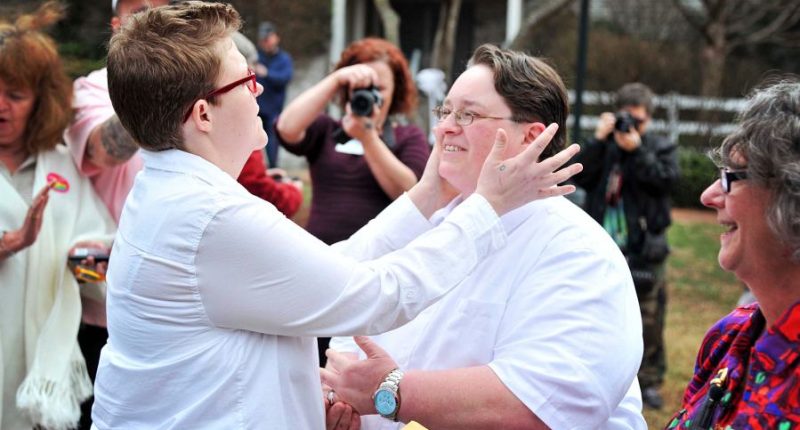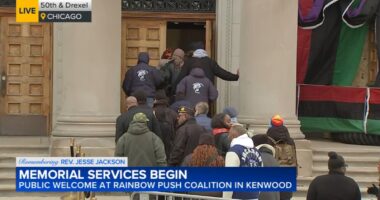Share this @internewscast.com

COLUMBUS, Ohio (AP) — A landmark U.S. Supreme Court ruling 10 years ago this month, on June 26, 2015, legalized same-sex marriage across the U.S.
The landmark Obergefell v. Hodges case was the culmination of years of intense national debate, with states divided on how to approach the matter. Some states opted to safeguard domestic partnerships or civil unions for same-sex couples, while others maintained that marriage should be solely between a man and a woman.
In Ohio, where plaintiff James Obergefell resided, voters decisively passed an amendment in 2004 that aligned with the federal Defense of Marriage Act’s exclusion of federal recognition for same-sex marriages. This set the stage for the significant legal challenge that would eventually bear Obergefell’s name.
Here’s what you need to know about the lawsuit, the people involved and the 2015 ruling’s immediate and longer term effects:
Who are James Obergefell and Rick Hodges?
Obergefell and his long-term partner, John Arthur, were based in Cincinnati and had shared their lives for nearly twenty years by the time Arthur was diagnosed with ALS, or amyotrophic lateral sclerosis, in 2011. Obergefell took on the role of caregiver as Arthur’s health deteriorated due to the progression of the disease.
When in 2013 the Supreme Court struck down the federal Defense of Marriage Act, which had denied federal recognition of same-sex marriages, the pair acted quickly to get married. Their union was not allowed in Ohio, so they boarded a plane to Maryland and, because of Arthur’s fragile health, married on the tarmac.
It was when they learned their union would not be listed on Arthur’s death certificate that the legal battle began. They went to court seeking recognition of their marriage on the document and their request was granted by a court. Ohio appealed and the case began its way up the ladder to the nation’s high court.
A Democrat, Obergefell made an unsuccessful run for the Ohio House in 2022.
Rick Hodges, a Republican, was director of the Ohio Department of Health from August 2014 to 2017. The department handles death certificates in the state. Before being appointed by then-Gov. John Kasich, Hodges served five years in the Ohio House. Acquainted through the court case, he and Obergefell have become friends.
What were the legal arguments?
The lawsuit eventually titled Obergefell v. Hodges argued that marriage is guaranteed under the U.S. Constitution’s Fourteenth Amendment, specifically the due process and equal protection clauses.
The litigation consolidated several lawsuits brought by same-sex couples in Ohio, Kentucky, Michigan and Tennessee who had been denied marriage licenses or recognition for their out-of-state marriages and whose cases had resulted in conflicting opinions in federal circuit courts.
In a 5-4 decision, the Supreme Court ruled the right to marry is fundamental, calling it “inherent in the liberty of the person,” and therefore protected by the Constitution. The ruling effectively nullified state-level bans on same-sex marriages, as well as laws declining to recognize same-sex marriages performed in other jurisdictions.
The custody, property, tax, insurance and business implications of of the decision have also had sweeping impacts on other areas of law.
How did the country react to the decision?
Same-sex marriages surged in the immediate wake of the Obergefell decision, as dating couples and those already living as domestic partners flocked to courthouses and those houses of worship that welcomed them to legalize their unions. Over the ensuing decade, the number of married same-sex couples has more than doubled to an estimated 823,000, according to June data compiled by the Williams Institute at the University of California Los Angeles School of Law.
Not all Americans supported the change. Standing as a national symbol of opponents was Kim Davis, a then-clerk in Rowan County, Kentucky, who refused to issue marriage licenses on religious grounds. She was briefly jailed, touching off weeks of protests as gay marriage foes around the country praised her defiance.
Davis, a Republican, lost her bid for reelection in 2018. She was ordered to pay thousands in attorney fees incurred by a couple unable to get a license from her office. She has appealed in July 2024 in a challenge that seeks to overturn Obergefell.
As he reflects of the decision’s 10th anniversary, Obergefell has worried aloud about the state of LGBTQ+ rights in the country and the possibility that a case could reach the Supreme Court that might overturn the decision bearing his name.
Eight states have introduced resolutions this year urging a reversal and the Southern Baptist Convention voted overwhelmingly at its meeting in Dallas earlier this month in favor of banning gay marriage and seeing the Obergefell decision overturned. Meanwhile, more than a dozen states have moved to strengthen legal protections for same-sex married couples in case Obergefell is ever overturned.
In 2025, about 7 in 10 Americans — 68% — said marriages between same-sex couples should be recognized by the law as valid, up from 60% in May 2015.

















